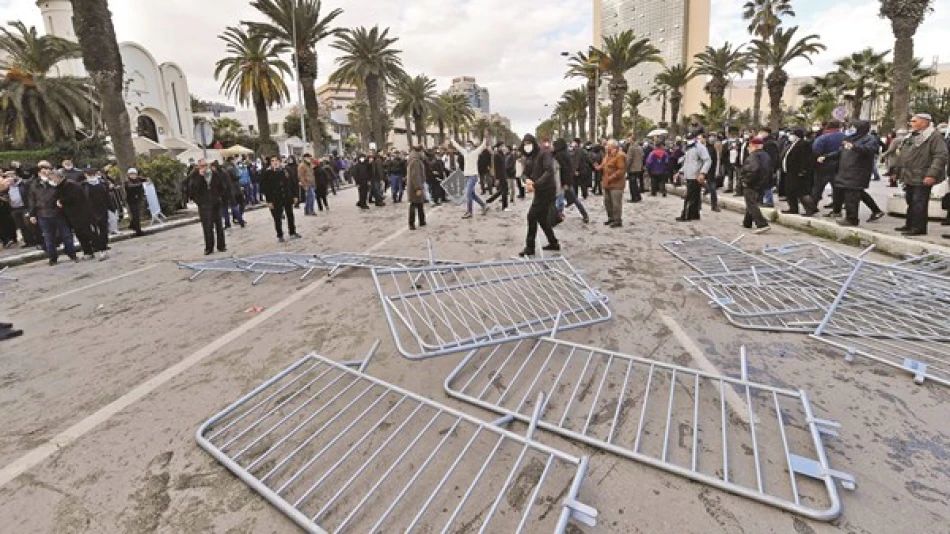
Experts Debunk Muslim Brotherhood's Misinformation Campaign Hindering Tunisia's Reform Efforts
Tunisia's Ennahda Movement Accused of Sabotaging National Reform Agenda Through Economic Manipulation
Tunisian political analysts are raising alarm over what they describe as a systematic campaign by the Islamist Ennahda movement to derail the country's political and economic reform process. The accusations center on alleged deliberate market manipulation, artificial shortages of consumer goods, and coordination with foreign entities to pressure Tunisia's government—tactics that analysts say reveal the movement's willingness to sacrifice national stability for political relevance.
Manufactured Crises as Political Weapons
According to Tunisian political activist Soheib Al-Mazriqi, Ennahda—the local branch of the international Muslim Brotherhood organization—has deployed what he calls "systematic lies and sabotage practices" to undermine state reform initiatives. The strategy allegedly involves leveraging business networks and lobbying groups affiliated with the movement to create artificial shortages of essential goods while driving up prices.
"The movement is working to abort the reform path adopted by the Tunisian state through deliberate creation of living crises," Al-Mazriqi explained, pointing to coordinated efforts to manipulate consumer markets and incite international pressure on the country.
Institutional Infiltration and Administrative Sabotage
The accusations extend beyond market manipulation to claims of institutional sabotage. Analysts suggest that Ennahda supporters embedded within government administrations and state institutions are actively working to obstruct state projects and hinder public services. This internal resistance, they argue, aims to create popular discontent while exhausting the government's capacity to implement necessary reforms.
The movement's tactics reportedly include organizing limited protests designed to amplify the appearance of opposition and maintaining communication channels with foreign entities—a strategy that critics say prioritizes political positioning over national interests.
Historical Context: From Governance to Opposition
The current tensions reflect Tunisia's complex political evolution since the 2011 Arab Spring. Ennahda dominated Tunisian politics for much of the past decade, participating in multiple coalition governments before President Kais Saied's dramatic intervention in July 2021, when he suspended parliament and dismissed the government.
University professor and analyst Manal Waslati argues that Ennahda's current approach represents a continuation of patterns established during their time in power. "When they were in government, they turned the state into partisan spoils and failed its institutions," she noted, suggesting that the movement's current opposition tactics reflect similar disregard for institutional integrity.
The Democracy Paradox
Waslati highlighted what she sees as fundamental contradictions in Ennahda's positioning. "The Brotherhood raises slogans of democracy and freedom, while they were the first to abuse those values when they were in power," she observed. This criticism touches on broader debates about Islamist movements' relationship with democratic governance across the Middle East and North Africa region.
Regional Implications and International Dimensions
The allegations against Ennahda reflect broader regional dynamics surrounding Islamist movements and their relationship with state power. Similar tensions have emerged across the Arab world, from Egypt's crackdown on the Muslim Brotherhood to the UAE's designation of the organization as a terrorist group.
For Tunisia, these internal political battles carry particular significance given the country's role as the Arab Spring's sole democratic success story. International observers have watched with concern as President Saied has consolidated power while promising eventual democratic restoration.
Economic Stakes and Reform Challenges
The political maneuvering occurs against the backdrop of Tunisia's severe economic challenges. The country faces mounting debt, high unemployment, and ongoing negotiations with international creditors. Any systematic effort to undermine economic stability—whether through market manipulation or administrative obstruction—carries potentially devastating consequences for a nation already struggling with financial crisis.
The accusations suggest that political competition in Tunisia has evolved beyond traditional democratic contestation into what analysts describe as economic warfare, where market stability becomes a casualty of political positioning.
Public Trust and Political Legitimacy
Perhaps most significantly, these developments highlight the erosion of public trust in Tunisia's political institutions. Analysts suggest that Tunisian society has grown increasingly skeptical of political rhetoric from all sides, developing what Waslati describes as greater awareness that "the path to the future will not be built with false slogans, but with work and serious reform."
This evolution in public consciousness may prove more decisive than any particular political maneuver, as Tunisians increasingly demand practical solutions over ideological positioning. The ultimate test for both Ennahda and the current government will be their ability to contribute constructively to Tunisia's economic recovery and democratic development—challenges that require cooperation rather than sabotage.
Most Viewed News

 Layla Al Mansoori
Layla Al Mansoori






